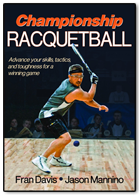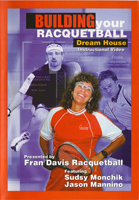Center Court: Positioning and Observing
When you are good center court position, down and ready, you are on defense and your opponent who is hitting the ball is on offense. You have put yourself in the best possible position to get to whatever ball your opponent hits that is left up and getable. Remember good center-court position is located approximately in a 6-foot-by-6-foot area behind the dotted line because 80 to 90 percent of all balls that are hit wind up in the back half of the court. Therefore, center court is in the middle of the back half of the court. There are a










